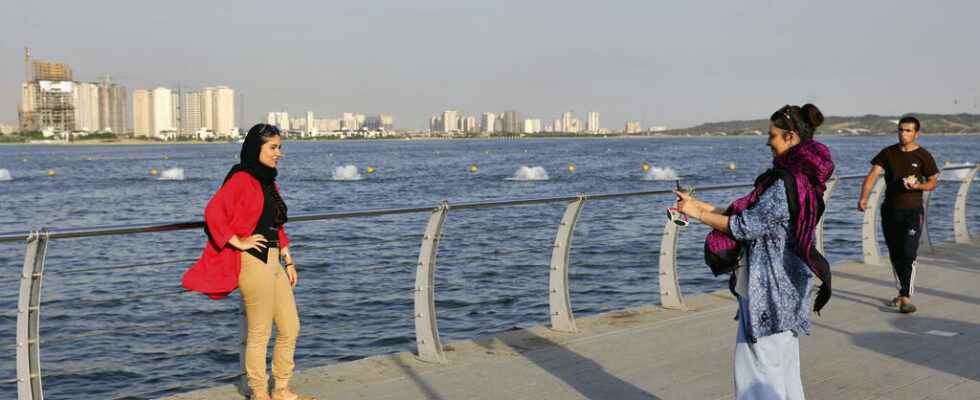A social media campaign has called on women in Iran to go bareheaded on their daily commute on Tuesday, July 12. Videos of women without veils have flooded the web. The men and women who support this movement against the compulsory wearing of the hijab hope that it will continue.
Malhieh is an engineer and lives in Tehran. For a long time, as soon as she can, she lets her veil fall on her shoulders. ” In the city center, it’s a bit complicated, she acknowledges. There are a lot of law enforcement agencies looking for women who don’t wear it. So the 30-year-old is waiting to be in a less crowded neighborhood to lead what she considers a peaceful struggle for women’s rights. She knows the risks, her friends have been arrested in front of her eyes for refusing to cover their hair. “ They were released at the end of the day, but they had to sign some kind of contract promising not to do it again “. Do they keep going out bareheaded? ” Yes Malhieh replies, her voice suddenly muffled.
Last Tuesday, the day of hijab and chastity, many women gathered at the call of the authorities to support the dress rules imposed on women. But that day, another operation was taking place, less obvious, because unauthorized: everywhere in Tehran and in the big cities of Iran, women removed their veils on the public highway. ” For the first time, I saw that I was not alone walking without my veil. It gave me hope Malieh explains with a suddenly lighter tone. ” I really hope this is just the start. »
Despite the concern for her daughter, Malhieh’s mother supports her in her struggle, but she does not want to take off her veil. “ That doesn’t stop him from fighting for our freedom, says Malhieh. Muslims in Iran do not believe in this obligation to wear the hijab. Today it has nothing to do with religion. It’s political. Women from political backgrounds support the compulsory wearing of the hijab. »
The new generation doesn’t care about this policy
The men have also joined in the #No2Hijab campaign on social media. Bahram followed him from France where he settled. Around him, he sees more and more men supporting women’s rights. ” They are the second generation after the Islamic revolution and they have wives and daughters. They realize that they are not safe in this society. So these men realize they have to act, too. »
This generational change is also perceptible in the actions carried out by the youngest, adolescents. A video has particularly circulated on social networks. ” We see young people who are around 18 years old, dressed in Western style. They make up and have fun “, describes Azade. She is 30 years old and has gone to live in France. ” These young people don’t care about the hijab, they don’t care about this policy, they don’t understand it. »
For Azadé, the big difference between her and these young people who are only ten years younger is that their parents support them. ” The Shiraz teenagers were arrested and detained days after this video, but their parents are struggling with them. Me, I remember ten years ago, when I went out in the street with my friends, if we were arrested by the police, our parents refused to pick us up. A few days after the Shiraz youths were arrested, a new crowd of young people gathered in the same park to dance to music. Again, the girls did not wear veils.
” The fight is not just about the hijab »
Despite this surge of hope, the fight is likely to be long. Azadeh spoke with several of her friends who remained in Iran. Some in the most remote areas have not even heard of the campaign, others were too scared to take action. ” The fight isn’t just about the hijab. There are many other issues that women across the country struggle with on a daily basis between cultural and political issues. It’s not because they don’t go out in the street, veil in hand, shouting “freedom !” that they are not mobilized. »
The main problem remains the economic crisis. The country continues to crumble, between endemic corruption and the sanctions imposed by the United States since their withdrawal from the nuclear deal in 2018. In the country, demonstrations have multiplied in recent months. They are carried out particularly by retirees, professors and other civil servants who do not receive their pensions or salaries.
At the same time, arrests within civil society have accelerated. The Center for Human Rights in Iran (CHRI) makes a direct link with the arrival of a new leader, General Mohammad Kazemi as head of intelligence for the Revolutionary Guards. On June 28, a few days later, Supreme Leader Ali Khamenei called for a return to the order of 1981 the day after the establishment of the Islamic revolution. A dark period of repression where thousands of people were executed. Among the latest personalities arrested this month are Jafar Panahi, Golden Bear for best film at the 2015 Berlin festival, and Mostafa Tajzadeh, former deputy interior minister and figure of the reform movement.
